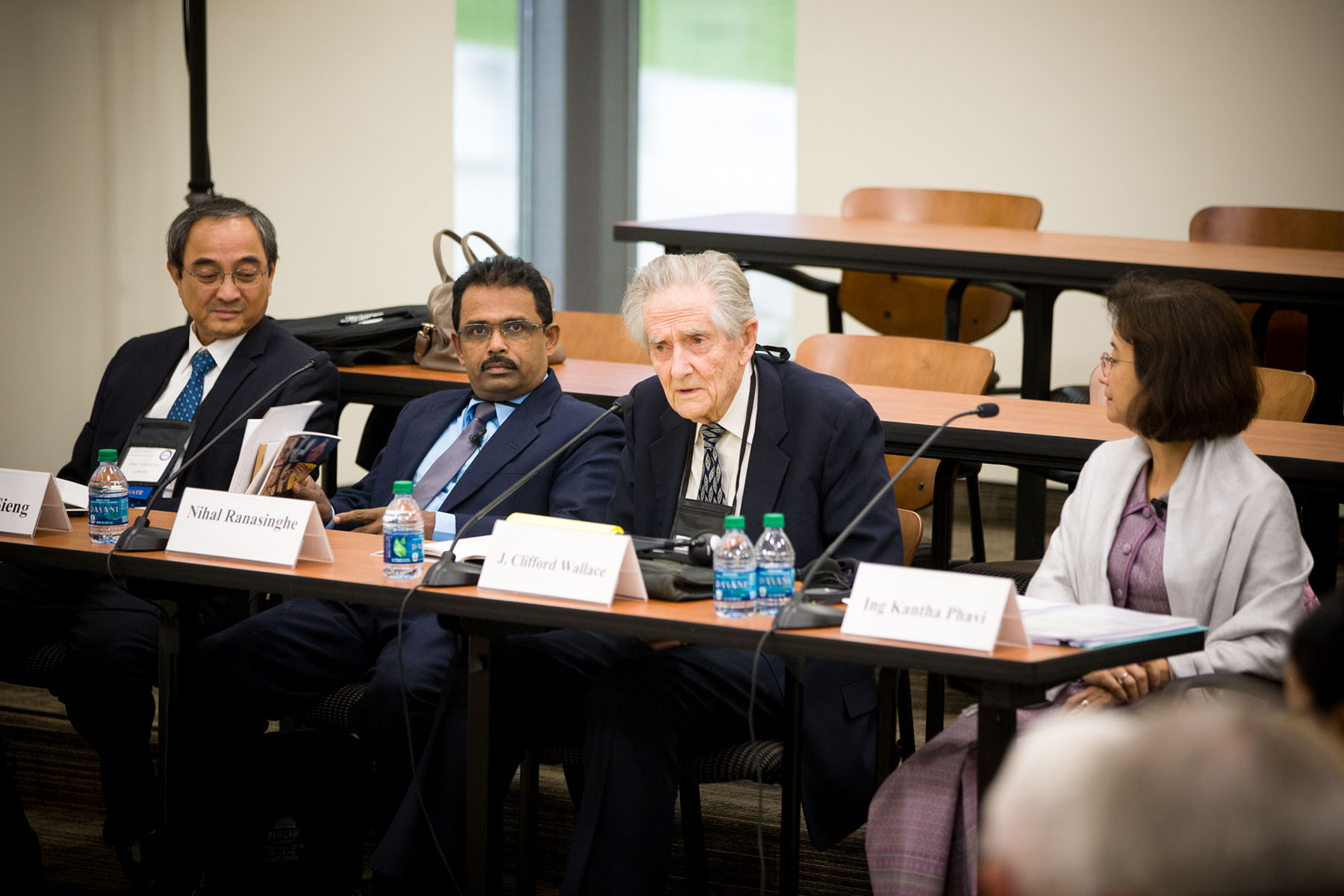2016 Symposium: Cambodia and Sri Lanka

by Sandy Stephenson
J. Clifford Wallace, Chief Judge Emeritus, U.S. Court of Appeals for the Ninth Circuit, moderated the session on Cambodia and Sri Lanka. Panelists were Ing Kantha Phavi, Minister of Women’s Affairs, Cambodia, Nihal Ranasinghe, Controller General of Immigration and Emigration, Department of Immigration and Emigration, Sri Lanka, and Thai Sieng Trac, Vice Governor of Phnom Penh, Cambodia.
Ing Kantha Phavi spoke on Preserving Women and Family Rights. She stated that the role of men and women has been changing in Cambodia. The extended family remains very important, especially with regard to financial support. It is common to have three generations living together under one roof. Minister Phavi works to promote the role of women in society and a culture of peace, as well as strengthening families to increase prosperity. Women are considered the pillar of the family. However, women need to be enabled to contribute to family finances.
Men and women have equal rights before the law. There are also laws that protect women. Minister Phavi’s goal is to increase protection of the national culture and women in society. She suggested using the teachings of Buddha to inspire law creation to further protect women’s rights. She also noted that a committee has been formed with the goal of stopping pornography.
There is a growing problem of a secular vision in society. It has had a significant impact on old society, and is changing current society.
With the Empowerment of Women Policy in place, Minister Phavi suggested ways to change the traditional vision of society:
a)Give women access to education opportunities.
b)Work with parents to advocate greater education.
c)Facilitate legal protection for women.
d)Provide women with opportunities to influence policy changes.
The nation needs to be educated on this new role of men and women, and to engage them in ways to support greater opportunities for women in the household sphere.
Nihal Ranasinghe began with some statistics on religious membership in Sri Lanka–70% are Buddhist, 13% Hindu, 10% Muslim, and 7% Christian. Education plays a big role in peaceful living. Mixed marriages are allowed, but each is encouraged to practice their individual religions. Sri Lanka has a society which promotes economic and religious freedom. Good communication between religious groups is encouraged. All communication is sent in the three languages.
In Sri Lanka, there are no legal barriers in the practice of any religion. All are free to choose and practice their beliefs. Mr. Ranasinghe sees no difficulties between secular or religion based organizations, and believes there are no conflicts between various groups within the society. He stated that the atmosphere is very positive, with little or no religious freedom problems in their society.
Thai Sieng Trac spoke of the Situation in Cambodia in a World of Plurality. Pol Pot, of the Khmer Rouge regime, suppressed freedom of religion. After the regime change, the Buddhist religion was able to bring peace of mind and resilience to live again. There has been tremendous growth in this area since 2005. Cambodians can now express their rights and beliefs. Active governmental measures are being taken to prevent intolerance. It is important to protect the needy and silent majority of citizens.
Since the time of the Khmer Rouge, the Cambodian state has sought to preserve public peace against publications of intolerance. Mr. Trac sees no conflicts in keeping the peace and in preserving family life. He noted that the practice of religion is essential in the transmission of values. Professional education is also essential in maintaining a stable society. Without religion, people have a difficult time finding their own personal balance. Political leaders can build a cohesive society capable of maintaining convictions and values, and protect against economic events. Compassion is important in a world of trials and intolerance.
There is a national policy for women, “Education for all and all for education.” This policy reduces the school drop-out rate. It is encouraged that more qualified people with greater knowledge access the labor market. Nine years of school is being encouraged. Many girls drop out because of economic reasons and poverty. Parents are relying on children for financial support. One challenge is how to compensate the family in order to keep children in school.
It is a long term effort to fight violence against women. This is being done through comprehensive education, counseling, applying the teaching of Buddha, forgiveness, compassion, and love. When the woman is absent in the home, the family is unstable and separated. It is Mr. Trac’s goal to strengthen women in their role.
There is currently a problem of an insufficient number of counselors. They need to increase the number of qualified counselors. During the Khmer Rouge regime, there were forced marriages; and there is a need to offer needed counseling and assistance to these individuals. There is a campaign to prevent trauma by implementing family laws, domestic laws, and the protection of women’s rights. Rehabilitation starts with counseling and employment through training.